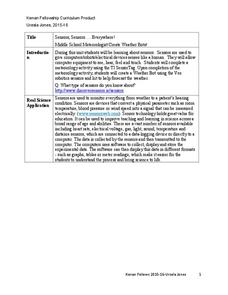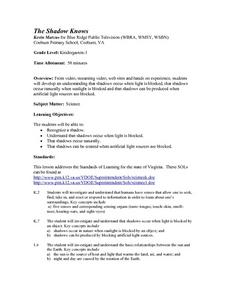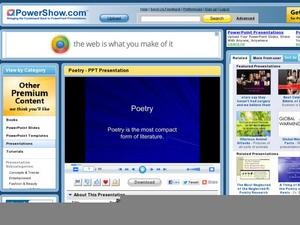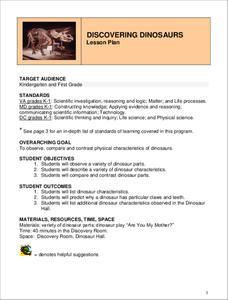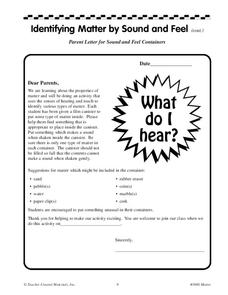Curated OER
Geography Experience: Low Vision
The world is a big and beautiful place; but how do you begin to understand it when you have low vision? Here is a great set of ideas focused on transforming any small room into a sensory paradise, themed to incite understanding about...
Institute of Electrical and Electronics Engineers
Be a Scanning Probe Microscope
Extensive reading is done in order to learn about scanning probe microscopy and nanoscale. Afterward, individuals use a pencil to probe an unidentified object that is inside of a box so that they cannot see it. Using only what they could...
Curated OER
Three Skeleton Key: Elements of Literature
Rats! How are they described in "Three Skeleton Key," and what happens to the characters in the story? Study the vocabulary and the story with these worksheets. Learners complete pre-reading activities, study vocabulary, complete...
Northwest Regional Educational Laboratory
Writing Prompts for Elementary, Middle and High Schools
Work on descriptive, narrative, persuasive, and expository writing with 110 prompts! The writing prompts are organized by type of writing. Several are separated into collections for younger students so you can find prompts for your...
Virginia Middle School Engineering Education Initiative
Save the Penguins: An Introduction to Thermodynamics and Heat Transfer
Heat things up in your physical science class with this interactive lesson series on thermodynamics. Through a series of class demonstrations and experiments, young scientists learn how heat is transferred through conduction, convention,...
Dick Blick Art Materials
Mehndi Art Gloves
Class members get a chance to practice the art of Mehndi as they use markets to apply patterns to a latex glove.
Howard County Schools
Maria’s Quinceañera
How long will it take to save up for a car? Classmates use linear and exponential models to see how money received during a Quinceanera will grow over time.
Kenan Fellows
Sensors, Sensors…..Everywhere! Middle School Meteorologist Create Weather Bots!
My forecast is that you'll want to use the resource. Pupils design and create a weather bot as part of a project-based unit. These bots should be able to measure temperature, humidity, barometric pressure, wind speed and direction, and...
Center for Technology in Teaching and Learning
CSI: The Experience - Family Forensics
Forensic scientists depend on their observation skills to analyze evidence down to the molecular level. Middle and high schoolers practice making observations and predictions with a series of crime scene activities, which includes a...
Biology Junction
Annelids: The Segmented Worms
Here's a lesson that just might make your class squirm! Learn about segmented worms in a detailed PowerPoint presentation including the wriggly earthworms young scientists dig up in their backyards. Although seemingly simple creatures,...
Curated OER
Objects Vibrate
Students strike a tuning fork and dip it in water. They sprinkle cereal flakes on a drum, than tap the top of the drum. Students stretch a rubber band between two fingers and pluck it; stretch the elastic farther and pluck it again. Then...
Curated OER
The Shadow Knows - Creating Shadows
Young learners recognize a shadow and witness how shadows occur when light is blocked. They access streamed video, standard video, and websites in order to engage in their study of how light is naturally blocked to create shadows. An...
Curated OER
Poetry: The Most Compact Form of Literature
Introducing or need to review literary devices and terms for a study of poetry? Though text heavy, the explanations and examples of key poetic devices will provide learners with the vocabulary they need to discuss and craft poems.
Curated OER
The Houdini Box: Compare and Contrast
How did Houdini do it? After reading a short passage about magicians and their tricks, readers are asked to compare and contrast some of the illusions these prestidigitators create.
Curated OER
Balance in Visual Art
High schoolers examine works of art to develop an understanding of the importance of visual balance in works of art and nature. Students research artists and their artwork for examples of visual balance. High schoolers create works of...
Curated OER
Discovering Dinosaurs
Students investigate the physical characteristics of dinosaurs. They participate in a puppet show, take a field trip to a dinosaur museum, and compare/contrast dinosaur characteristics at the museum.
Curated OER
Animal Coverings
Students compare and contrast the types of coverings found on animals. They identify a wide variety of animals in a museum room. They classify animals based on their coverings as well.
Curated OER
Identifying Minerals
Students compare and constrast a wide variety of minerals and rocks. They test them for streak, luster, color and other characteristics. They view an exhibit and compare their answers to them.
Curated OER
Math Prefixes
Students use a dictionary to gather appropriate information for writing simple definitions. They recognize prefixes that relate to numbers, such as mono-, bi-, and tri-. Pupils use their creative abilities to extrapolate new words to...
Curated OER
"Investigating Soil Color and Texture"
Ninth graders will identify/understand the differences between soil and dirt. They will classify soil color accurately and use Munsell notation to describe it (Munsell books provided).Students will classify soil texture using the feel...
Curated OER
Reading Examples
Young writers read excerpts from Gary Paulsen's memoir to identify figurative and literal language that contain sensory details. They determine which selections are examples of sensory language and fi the language is used literally or...
Curated OER
Identifying Matter by Sound and Feel
In this identifying matter by sound and feel worksheet, learners participate in an experiment to identify a wide variety of different types of matter in film containers supplied by each student.
Curated OER
Chemical Wonders
Learners read about and discuss how chemical engineers use different states of matter to create substances. In this chemical engineering lesson plan, students also give examples of the 3 kinds of matter.
Curated OER
The Ocean
Plant and animal life of the ocean is the focus of this science lesson. Young scientists sort a variety of seashells and explore why many sea animals have shells. They examine the shells, write journal entries highlighting the...









